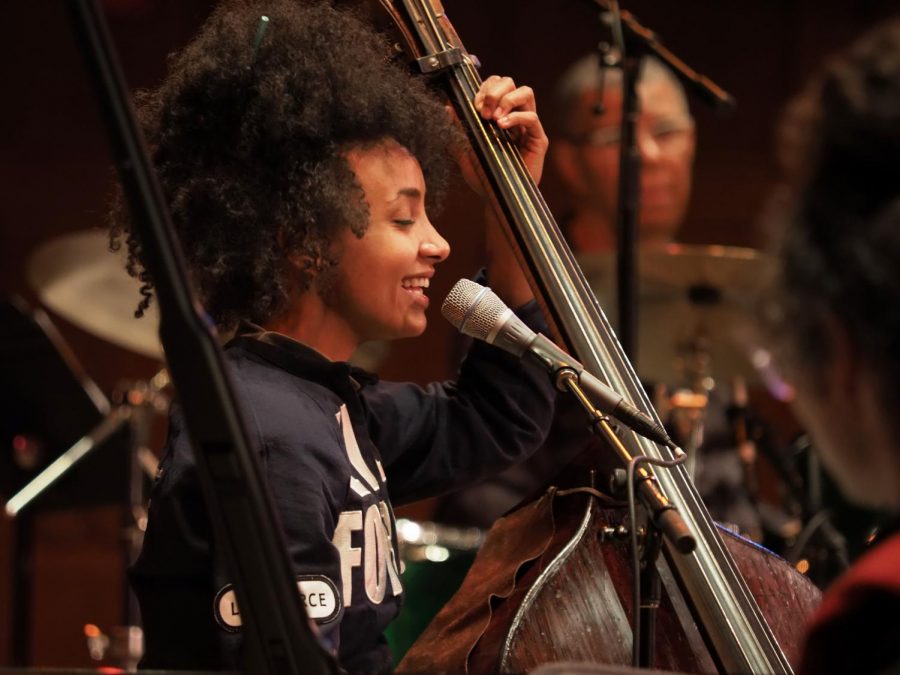Spring Quartet Wows in Highly Anticipated Celebratory Performance
Photo Courtesy of the Oberlin Office of Communications
Esperanza Spalding performs for a sold-out house in Finney Chapel Wednesday night.
If you were on campus this week, chances are you heard the buzz about Esperanza Spalding’s Wednesday performance, which lasted over two hours in Finney Chapel. What you may not know, however, is that Spalding’s performance was part of a three-day festival marking the Conservatory Jazz Studies department’s 30th anniversary.
College junior George Hawk was ecstatic that a fellow member of the student acapella group ’Round Midnight ran into Spalding at the Hotel at Oberlin.
“’Round Midnight does an arrangement of one [of] her songs called ‘Judas,’ so it was great to see her perform,” he said.
Tickets for the Spring Quartet became harder to secure as showtime approached — students scoured the Facebook pages trying to find their way into the event. This is not surprising, considering the lineup featured Jack DeJohnette on drums, Joe Lovano on saxophone, Leo Genovese on piano, and Spalding on bass and vocals.
“It’s impossible to choose just one musician who I enjoyed the most, as they each brought something engaging and brilliant to the stage,” said College senior Nia Burger. “Sometimes when you see a show where several individually famous musicians collaborate, their styles don’t mix well, and you can see a dissonance between their musical personalities — that was not the case for the Spring Quartet. Their individual talents and styles were only amplified by one another, which is part of what made the concert so incredible.”
Jack DeJohnette is a multi-award-winning collaborating artist. His ECM Records bio affirms he has an “unchallenged reputation as one of the greatest drummers of all time,” and is the recipient of a National Endowment for the Arts Jazz Master Fellowship in 2012 — the highest honor for jazz musicians.
DeJohnette’s career has spanned across decades, and he has performed with acts such as John Coltrane, Miles Davis, Thelonius Monk, Chet Baker, Betty Carter, and many more. He sat onstage with his drum kit on a raised platform — making his playing visible to all — and his masterful technique and skill established him as a powerhouse of the show. DeJohnette controlled the floor, adding jaw-dropping depth and rhythmic dynamics to the original pieces.
Joe Lovano has been lauded by Jazz Times and the Jazz Journalists Association for the tenor saxophone. He’s been nominated for more than 14 Grammys, winning one for his 52nd Street Themes. Lovano’s musical résumé includes performances with Woody Herman, John Scofield, Ravi Coltrane, and many others.
Throughout the performance, Lovano stood between Spalding and DeJohnette, producing lightning-speed solos. The saxophone was the quartet’s core melodic instrument — Lovano danced between thoughtful melodies and playful runs. He frequently disappeared to the side of the stage to listen to other solos, or shouted in excitement while leaning on the bass amp in the back.
Leo Genovese was turning heads on piano all night — audience members in the balcony found themselves peering over the side to get a better look. A graduate of Berklee College of Music, Genovese has performed with accomplished musicians such as Hal Crook, Darren Barret, and Chris Creek. He and DeJohnette had phenomenal performative chemistry. Genovese’s style on the piano played like a mouse running back and forth over the keys, while DeJohnette accentuated certain phrases and chords with crashes.
“I thought the pianist was particularly good,” double-degree sophomore Claudia Hinsdale wrote in an email to the Review. “His playing was uninhibited but not in a way that felt chaotic.”
It was Spalding, however, who piqued the interest of most students at the performance. She was the youngest of the quartet, and reached #4 on The New York Times’ list of the best albums of 2018. While her beautiful voice was only showcased for one song of the night, her eloquent phrasing on Milt Hinton’s 1790 Italian upright bass textured the auditorium with its low timbres.
“Though this wasn’t explicitly Esperanza Spalding’s concert, I would have liked to hear her sing more,” Burger said. “She has a wonderful voice that could have complemented many of the other tunes. I could see her vocalizing alongside her bass playing even when the mic was turned away from her and I was dying to hear what she was singing to herself.”
Witnessing just one of these outstanding musicians would be a treat — the four of them together made for a night to remember. They formed an impressive team, expertly listening to and playing off of each others’ musical choices. Their appreciation for one another was visible in their sways, grins, and nods. The palpable excitement on the stage was matched by the gathered audience, who sat forward in their seats and followed every solo and song with resounding applause. The evening featuring such titans of the genre was a perfect way to close out the festival, which also featured a collection of films and panels and a faculty performance, all between April 15 and April 17.
“This celebration of the Jazz Studies degree can be thought of as a tribute to the faculty, staff, and students who made Oberlin’s Division of Jazz Studies a world leader in the education of jazz musicians over these past three decades and more,” wrote Acting Dean of the Conservatory William Quillen in the event pamphlet.
The Spring Quartet was a truly remarkable evening, and an apt celebration of 30 years of phenomenal jazz education at Oberlin.










